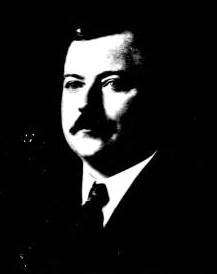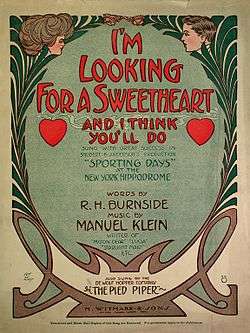Manuel Klein
Manuel Joachim Klein (6 December 1876 – 1 June 1919) was an English-born composer of musical theatre and incidental music who worked primarily in New York City.

Biography
Klein was born in London, to parents Herman and Adelaide (née Soman). Apparently, the elder Klein emigrated from Riga, Latvia.[1] Once in Norwich, Hermann became a professor of foreign languages at the King Edward VI Grammar School, and Adelaide taught dance.[2] The younger Klein's five brothers included Max, a violinist; Charles, a playwright; Herman, a music critic and music teacher;[3] Alfred, an actor; and Philip. They had a sister, Adelaide.[4] He was the uncle of producer Philip Klein (1888–1935). Klein was educated in London and at Tivoli House Academy, Gravesend, Kent, England.[5]

Career
Klein moved to the US on 11 April 1896.[6] He was the music director for David Belasco's theatre company in New York City for several years[7] before devoting himself to composing. His first Broadway success was the musical Mr. Pickwick, starring De Wolf Hopper.[8] Grant Stewart wrote the lyrics, and Klein's brother Charles wrote the book. He also conducted for Charles Frohman, with whom Klein's brother, Charles, was later killed on the RMS Lusitania, among others.
Tin Pan Alley songwriter and publisher Gus Edwards helped Klein to obtain the position of musical director of the prestigious New York Hippodrome theatre in 1905. Klein was soon composing songs and music for numerous spectacles presented at the Hippodrome consisting of different acts, each one with their own thematic musical concept. He collaborated with L. Frank Baum on The Tik-Tok Man of Oz, beginning in 1909, which was finally produced in 1913 without Klein's music.[9] He left the Hippodrome in 1915 after a disagreement with its manager, Jacob J. Shubert, over the orchestra. Shubert asked Klein to send some drums, trumpets and other instruments over to the Winter Garden Theater, where he was producing another show. Klein refused to send them, as he needed them for his own orchestra. After an argument, Klein offered his resignation and Shubert accepted it. The Hippodrome company sided with Klein, and Shubert was forced to sell his interest.[10] Klein went back to England the same year and became music director of the Gaiety Theatre, London. He suffered a trauma at the bombing of the theatre during World War I by the Zeppelins and never fully recovered.[11]
Klein returned to New York and died in Yonkers, New York on 1 June 1919, as a result of the earlier trauma.[11] After his death, the Klein family sued the German government for the loss of Manuel and his brother Charles (a victim of the sinking of the RMS Lusitania).[12]
Family life
Klein married his wife, Helen (born 16 September 1884 in Cincinnati, Ohio),[13] in approximately in 1905.[14] They had a daughter, Marjorie, born 28 March 1909 and a son, Gerald, born 18 March 1912.[15] Klein became a naturalised American citizen on 9 August 1910.[15]
As of the 1930 United States Federal Census, the family had moved to Beverly Hills, California. Helen was working as a teacher, Marjorie as a stenographer for the movie industry, and Gerald as a radio repairman.[16]
List of works
|
|
Legacy
Although many individual songs by Klein were published, much of his incidental music remains in manuscript. Since he worked "for hire" at the Hippodrome, Charles Frohman and later R. H. Burnside retained his music manuscripts. They now form part of the Burnside collection of American theater music manuscripts in the Music Division of The New York Public Library for the Performing Arts.
Notes
- Stone, Christopher. "Herman Klein, July 23, 1856 – March 10, 1934", reprinted in Moran, p. 603
- Who's Who in New York (City and State). Lewis Historical Publ. Co., 1909, p. 787. A petition from the Jews of Norwich, Norwich Petition For the Removal of the Disabilities of the Jews, 24 January 1848, includes the signature of a David Soman, boot and shoemaker, who could have been the father of Adelaide. Transcription in the archives of JewishGen.
- Klein and Moran, Introduction
- 1871 and 1881 England Census, available on Ancestry.com.
- Hines and Hanaford, p. 185
- Date based on Klein's passport application at U.S. Passport Applications, 1795–1925 at Ancestry.com.
- Klein and Moran, p. 5
- Complete Midi files for Mr. Pickwick Archived 26 May 2008 at the Wayback Machine
- Hearn, Michael Patrick. The Annotated Wizard of Oz. W.W. Norton, 2000, pp. 388–89
- "Manuel Klein" at the Composers and Lyricists Database
- "Death of Manuel Klein", The New York Times, 2 June 1919, p. 15.
- Gänzl, p. 1100
- Date from New York Passenger Lists, 1820–1957: S. S. Philadelphia, 26 November 1916
- Date based on information supplied in the 1910 United States Federal Census available at Ancestry.com
- Information based on U.S. Passport Applications, 1795–1925 at Ancestry.com.
- 1930 United States Federal Census available at Ancestry.com
- This list is assembled from Gänzl and the Internet Broadway Database, http://www.ibdb.com/person.php?id=7484.
References
- Gänzl, Kurt. The Encyclopedia of the Musical Theatre, 2nd ed. (New York: Schirmer Books, 2001), vol. 2
- Hines, Dixie and Harry Prescott Hanaford (eds.) Who's Who in Music and Drama New York: H. P. Hanaford (1914)
- Klein, Herman and William R. Moran. "Herman Klein and The Gramophone", Amadeus Press, 1990. ISBN 0-931340-18-7